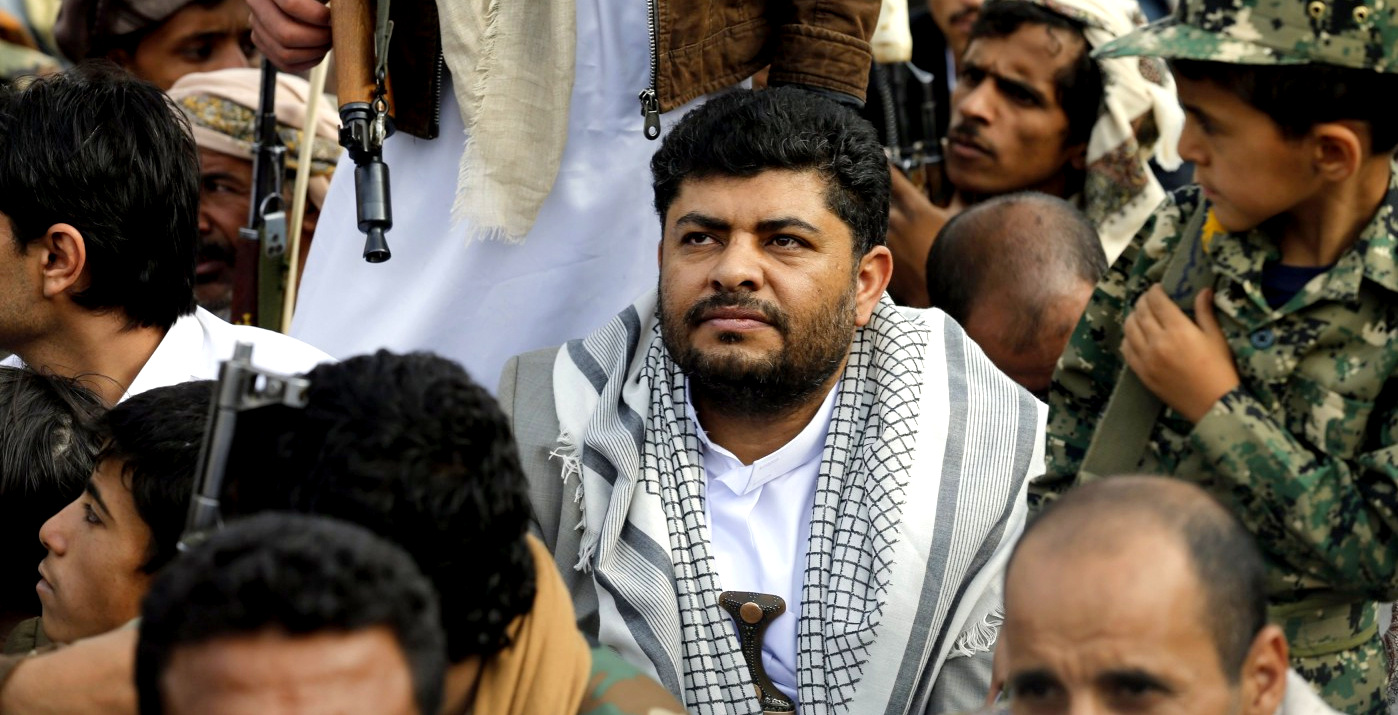Ansarullah Leader Explains How US and UN Sandbagged Yemen Peace Talks
YemenExtra
Interview with the head of the revolutionary committee in Yemen Mohammed Ali al-Houthi, by Randi Nord, a journalist and co-founder of Geopolitics Alert. She covers U.S. foreign policy in the Middle East with a special focus on Yemen.
“The last thing Saudi Arabia and its Western allies want is a self-sustaining, economically viable, militarily strong, and anti-imperialist Yemen at the bottom of the Arabian Peninsula, controlling the Red Sea and its strategic waterways. Yemen’s geographic placement in regards to the flow of world capital cannot be stressed enough.”
The U.S.-backed, Saudi-led war against Yemen is entering its fourth year. This war has killed over 13,000 people, injured over 21,000, devastated civilian infrastructure, triggered a famine, and created one of the worst man-made (and very preventable) humanitarian disasters on the planet.
As a result of the Saudi-initiated and U.S.-enforced land, sea, and air blockade, over 8 million Yemenis face famine, while another 17 million are food insecure. The blockade, by restricting medical supplies and basic goods, has also triggered a devastating cholera outbreak unprecedented in modern times.
Riyadh has failed nearly all of its objectives. The Saudis originally launched the war against Yemen in 2014 to crush Yemen’s rising revolutionary movement, Ansarullah, after the successful removal of Saudi Arabia’s puppet government led by Abdrabbuh Mansur Hadi.
Yemenis had long resisted Hadi’s government, as it paved the way for infliction of Western and Saudi military and economic imperialism on the poor nation. It was under Hadi that the United States expanded its so-called War on Terror, in which American drones rained down death and destruction on civilians while claiming to target al-Qaeda in the Arabian Peninsula (AQAP). However, under Hadi’s leadership and his cozy relationship with the United States and Saudi Arabia, al-Qaeda only seemed to flourish — just as it had for years under the former President Ali Abdullah Saleh’s rule.
Ansarullah’s history dates back to the early 1990’s, nearly two decades before AQAP became the substantial threat it is today. Still, Ansarullah leaders, like Mohammed Ali al-Houthi and Hussein Badreddin al-Houthi, recognized the problems created by foreign meddling. While reactionary forces grew in countries like Afghanistan, thanks to support from the United States, Ansarullah provided an ideological counterweight and grassroots resistance. Leaders preached tolerance, basic freedoms, and government accountability that supports the Yemeni people rather than foreign entities.
Today, Ansarullah’s public support is stronger than ever. Despite financial devastation from the blockade, Yemenis under its control are grateful for self-sustainability and, most importantly, protection from terror groups like AQAP and ISIS.
They are also proud to defend their country against one of the wealthiest nations in the world, without support from any foreign entities.
In addition to botching a war that Riyadh likely (foolishly) never expected to last this long, Saudi Arabia has spent money totaling in the hundreds of billions of dollars — at the very least. A since-deleted article from Al-Monitor estimated costs at $200 million per day. This can’t possibly have a positive effect on Saudi Arabia’s overall economy.
Who and what stand in the way of peace

So, why can’t Yemen achieve peace?
Western media would have you believe that the grassroots resistance movement of Ansarullah is causing the turmoil, blaming the very victims of war to justify American support for what could arguably be described as a Saudi-led genocide against Yemen. This tactic is very useful for discrediting Ansarullah’s genuine grievances, pinning the blame for failed peace talks, and distracting the public from Western-backed Saudi and Emirati war crimes.
It should come as no surprise that the same media remained silent when the president of Ansarullah’s Supreme Revolutionary Committee, Mohammed Ali al-Houthi, submitted a six-point reconciliation plan to the United Nations. Beyond that, more silence when the movement sent a delegation to various European and Arab countries to bolster diplomatic ties and spearhead a possible peace process.
To break the media blackout and provide balanced coverage, MintPress News spoke to Mohammed Ali al-Houthi about his movement’s experience with previous peace talks, the recent reconciliation plan, how the media portrays Ansarullah, and the international community’s responsibility in creating this humanitarian catastrophe.
On the initial aggression, al-Houthi had this to say:
“The attack and the aggression on Yemen was not born of the moment but was prepared by previous plans. This was revealed by the former UN envoy, Jamal Benomar, when he delivered a message to the leader of the revolution, Mr. Abdulmalik Badruddin al-Houthi, which said that America and ten other countries of the Gulf Cooperation Council initiative are ready for armed intervention to confront us militarily if we did not stop the revolution against the corrupt government.”
The Gulf Cooperation Council (GCC) initiative in 2011 set the stage for the war that continues to this day. After intense protests and months of back-and-forth negotiations, the late President Saleh finally agreed to step down. Saleh met with members of the GCC and eventually signed a transitional agreement after a series of backroom deals in Riyadh. The agreement left Saleh conceding power to Hadi, who was vice president at the time. Thirty days later, Hadi held a snap election specially designed by Saudi Arabia to ensure his victory. Both Ansarullah and Yemen’s Southern Movement called for election boycotts.
Protests and clashes continued in various parts of the country citing corruption and high fuel prices. In September of 2014, this reached a climax when members of the Ansarullah movement — along with supporters of Saleh’s party, the General People’s Congress (GPC) — gradually took control of the capital city. Hadi resigned in 2015 after Ansarullah and GPC supporters seized the presidential palace and key government buildings.
After attempting to set up an improvised capital in Aden, Hadi fled for Riyadh where he currently resides. The coalition still names Hadi as the “internationally recognized president” and has not stopped attempting to force his governance — on paper, this is the war’s entire purpose.
Shortly after, Saudi Arabia launched its military coalition to reinstate Hadi.
Three years later and the war shows no sign of slowing down.
Yemen’s growing revolutionary anti-imperialist movement threatens U.S.-Saudi regional hegemony

Despite Saudi Arabia’s receipt of heaping military and intelligence support from the United States and other Western allies such as the United Kingdom, France, Canada, and (previously) Germany, Yemen’s resistance movement has only grown stronger.
Ansarullah now controls the capital Sana’a, most of Yemen’s northern provinces, as well as over 100 miles of territory beyond the Saudi border. Here, Yemeni Special Forces, with the Army and Popular Committees, expanded operations in retaliation for Saudi Arabia’s devastating airstrike campaign.
Yemen’s Sana’a-based Defense Ministry has also vastly expanded military capabilities. Now, Yemen can domestically manufacture long-range ballistic missiles, naval missiles, anti-aircraft weapons, and reconnaissance drones. While the official narrative insists these parts come from Iran, both Tehran and Sana’a deny this is the case. Not only that, but documents obtained from Foreign Policy say the evidence is inconclusive. Prior to the war, Sana’a under Hadi and Saleh’s leadership was dependent on other countries — like the United States — for military equipment and support. As a key ally of George Bush Jr., the late President Saleh received at least $400 million worth of military aid. There is absolutely no shortage of weapons already inside Yemen.
The last thing Saudi Arabia and their Western allies want is a self-sustaining, economically viable, militarily strong, and anti-imperialist Yemen at the bottom of the Arabian Peninsula, controlling the Red Sea and its strategic waterways. The importance of Yemen’s geographic placement in regards to the flow of world capital cannot be stressed enough.
The Bab el-Mandeb Strait is a crucial choke point: nearly 59 billion barrels of petroleum and other liquid products pass through here each day as ships make their way to the Suez Canal and on to Europe. That’s nearly 61 percent of the world total. Whoever controls this portion of the Red Sea could potentially disrupt the flow of world capital and global trade.
And of course the fervor of a popular revolutionary movement isn’t something Riyadh wants flowing over its border, where Saudi Arabia is suppressing and bombing a decades-long uprising in the Qatif province.
Controlling the media to humanize war crimes
World powers in the coalition have directly facilitated countless war crimes. Whether they’re bombing civilian homes, running torture centers, restricting humanitarian aid, using internationally-banned weapons, or flooding the country with Blackwater contract mercenaries, every day brings a new tragedy the Yemeni people never deserved.
Al-Houthi explained that the United States, Saudi Arabia, and United Arab Emirates dominate international discourse to “humanize” their actions “as if they are defenders of humanity!” He believes they are able to achieve this because the U.S. has power through the media, politics, and economic standing to sway the general narrative and actions of international organizations such as the United Nations.
He pointed to the recent incident when the U.S. ambassador to the UN, Nikki Haley, displayed missile fragments, claiming the launch targeting Riyadh had put civilians at risk. However, the UN reported absolutely no civilian casualties for this event. Meanwhile, the Saudi coalition targets civilian homes on nearly a daily basis.
The U.S. and the coalition countries against Yemen appear to be leading the process of caring for civilians and humanitarian work while, in fact, they destroy humanity and kill civilians. Thousands of daily massacres have been committed against Yemeni civilians for three years and they continue to this very moment.”
To back this statement, al-Houthi cited the incident of Saudi Arabia blackmailing the UN in order to remove their name from a list of countries responsible for killing children and committing war crimes. Riyadh threatened to withdraw “hundreds of millions” in aid money and sever diplomatic ties with the UN, which forced the previous UN Secretary-General, Ban Ki-moon, to remove Saudi Arabia from the list. In 2014, Saudi Arabia donated $500 million to UN humanitarian relief funds, making it the largest single donor.
Turning Yemen into another Somalia through sabotaged peace initiatives
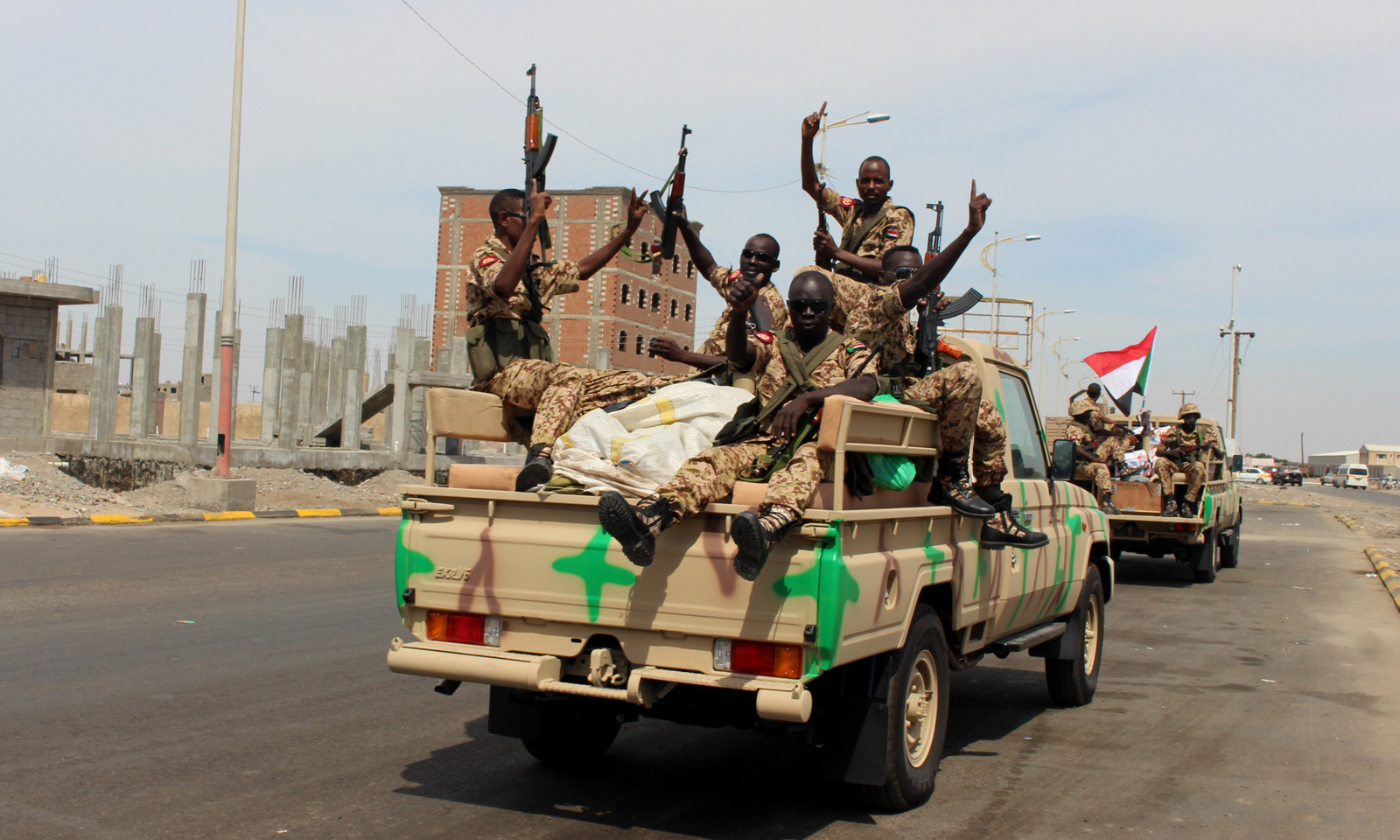
Saudi-backed Sudanese soldiers on a military vehicle gesture as they arrive to the port city of Aden, Yemen, Nov. 9, 2015.
During recent negotiations in February, the UN envoy to Yemen, Ismail Ould Cheikh Ahmed, claimed that, after working for hours, Ansarullah representatives “refused to sign in the last minute.” “In the end of the consultations, it became clear that the Houthis were not prepared to make concessions on the proposed security arrangements. This has been a major stumbling block towards reaching a negotiated solution,” he said, alluding to previous talks in Switzerland and Kuwait.
While the media portrays Ansarullah as the peace-talk saboteur, it is actually the U.S. ambassador who obstructs dialogue. Al-Houthi says his movement has made significant concessions in all previous potential agreements:
One day in Switzerland there was a dialogue session. The national delegation and the other delegations agreed to continue negotiations on that day, but the U.S. ambassador telephoned UN Envoy [to Yemen] Ould Cheikh and told him to cancel all dialogues. The dialogue was canceled and the delegation returned from Switzerland.”
He points out that a similar incident took place in Kuwait:
The American ambassador entered the room and said that if we do not comply [with] orders and the American demands, they will turn Yemen into another Somalia.”
Since the United States, Saudi Arabia, and the United Arab Emirates launched the war against Yemen, they have ensured a tight grip over the narrative of the conflict, painting it as fighting Iranian aggression and expansionism.
This has also allowed these aggressors to successfully control the terms during peace negotiations.
Al-Houthi explains that Washington supports the Wahhabis in Saudi Arabia, who act in accordance with U.S. interests: their political policies for the region go hand-in-hand. This manifests in Yemen throughout every action, from launching the war to dominating peace talks.
Washington’s hard-line stance and failure to support a proper dialogue (along with support for the Saudi coalition) is directly responsible for thousands of innocent Yemeni deaths. Al-Houthi says his movement has always called for peace since day one:
The one who hinders the dialogue today and who hinders peace in Yemen is the one who kills the Yemeni people … We are working for peace, and we have talked in all our speeches and movements. We have always called for dialogue, we welcome it, we are working for its success, but when there are countries like the U.S., Saudi Arabia, and the U.A.E., they insist on continuing their aggression on Yemen even if they haven’t achieved or gained anything from it besides killing thousands of our people.
I think it is important that there be full support for the initiative of the free members of the UN Security Council and the United Nations, and there should be full adoption of it as realistic points and reinforce the solution.”
Ansarullah leader submits peace plan to United Nations
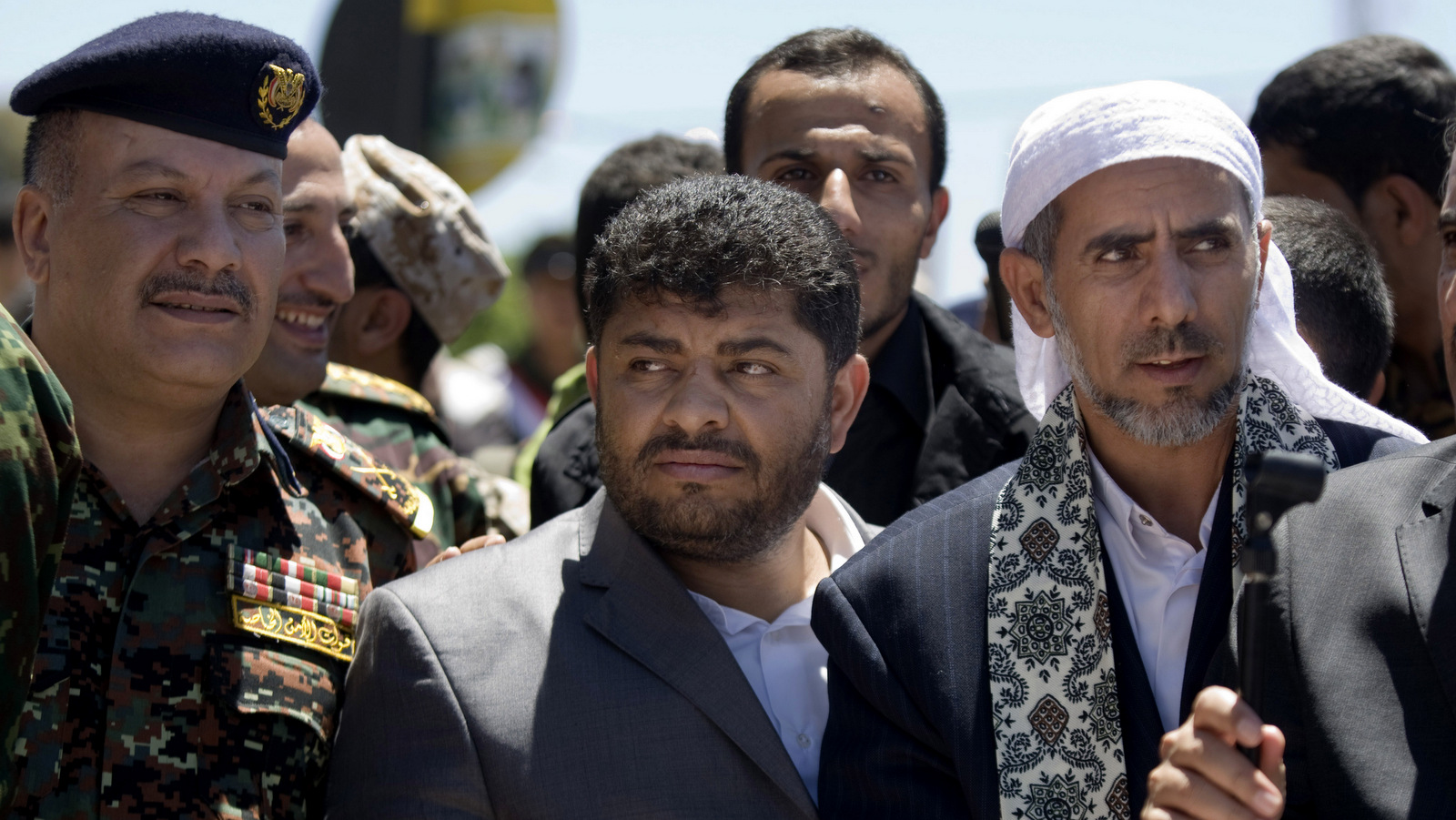
Mohammed Ali al-Houthi, who heads the Houthi rebels’ powerful Revolutionary Council, center, attends the funeral procession of victims who were killed from triple suicide bombing attacks that hit a pair of mosques in Sanaa, Yemen. (AP/Hani Mohammed)
The official statement opens by pointing out that the Security Council has failed to prevent “daily massacres against citizens in Yemen” and has essentially given up their responsibility in this matter. It reiterates the SC’s legal and moral responsibility to prevent further deterioration of the humanitarian crisis.
The six-point plan includes a concrete basis for building peace in Yemen without influence from foreign entities. The plan suggests initiating national elections for a governing body that includes all parties, granting amnesty to political prisoners, as well as launching reconstruction efforts and reparations.
Ansarullah also sent a small delegation on an international tour to bolster ties with Arab and European countries and spearhead the peace process.
Mainstream media outlets barely even mentioned this event. A Google search reveals three results: Newsweek, Middle East Monitor, and my own website. The search “Houthi delegation” reveals nothing relevant.
Once again, Yemen’s suffering was completely disregarded.
Al-Houthi wasn’t surprised. He says the Yemeni people understand that there aren’t many opportunities for peace, owing to the media blackout combined with the Saudi-U.S. regional hegemony and domination of international discourse.
The prevailing slogan among citizens of the Republic of Yemen is that America is the one who kills the Yemeni people and that this continuous aggression has had American political cover and military support. In addition to that, the U.S. took the central leadership of the coalition. That the reason for the continuation of our peoples suffering until today where Yemen is described today as the most tragic disaster in the world.”
Although he hasn’t received an official response, al-Houthi is holding out hope for peace. He said that the new UN envoy to Yemen hasn’t started official duties yet and could have a positive influence on the peace process provided he acts from a position of neutrality:
The former representative was so bad that he became a nightmare for the Yemeni people. He was doing everything in his power to meet the interests and objectives of the Saudis and the Americans as it is known to everyone.”
Responding to accusations of Iranian influence in Yemen
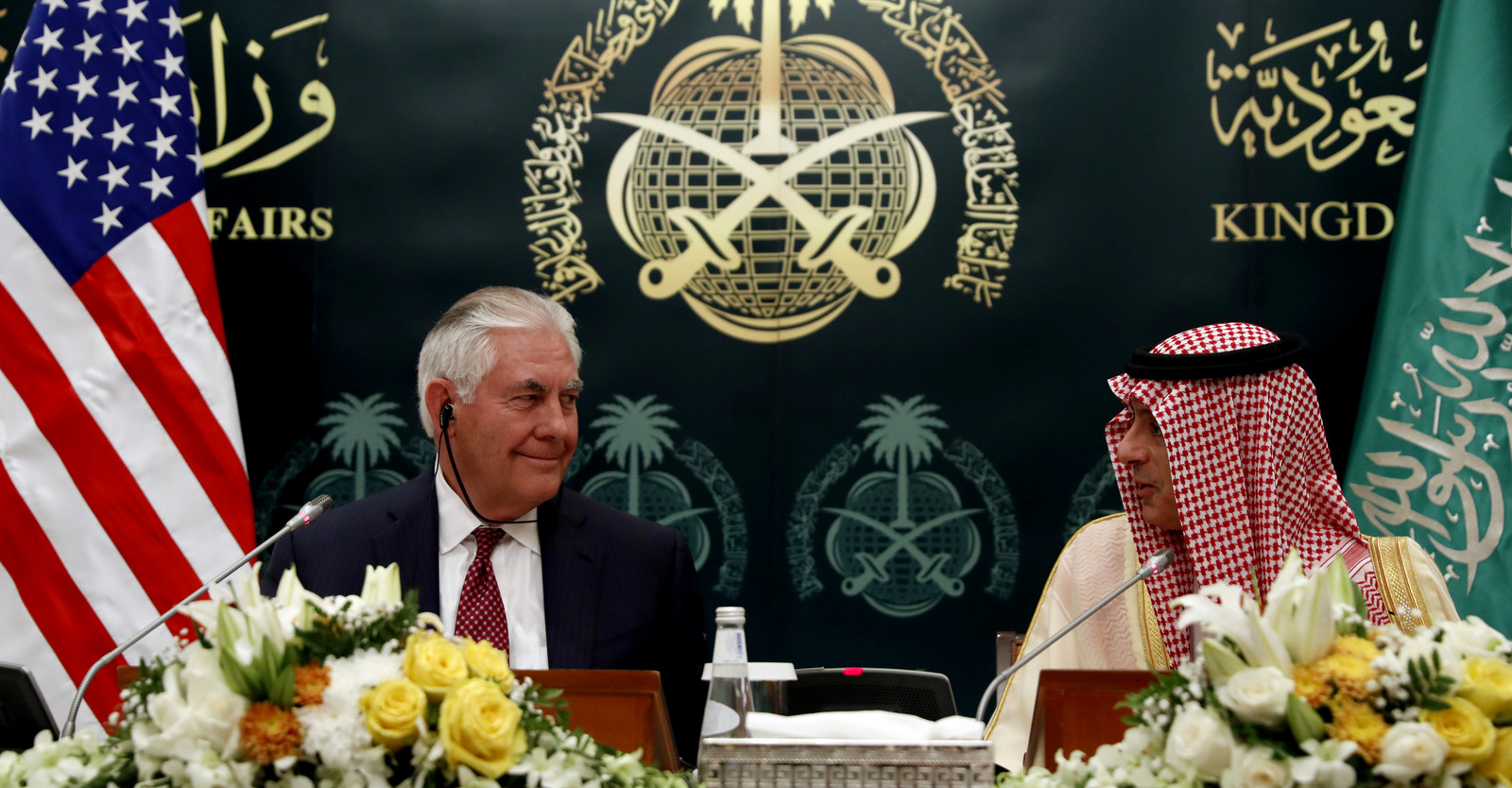
Secretary of State Rex Tillerson listens during a press conference with Saudi Foreign Minister Adel Ahmed Al-Jubeir, Oct. 22, 2017, in Riyadh, Saudi Arabia.
The accusation of Iran’s supporting of Ansarullah in Yemen serves a few purposes that benefit Saudi Arabia and Western powers. Not only does it publicly justify foreign intervention in Yemen, but al-Houthi says it also helps improve Riyadh’s public image.
The Saudi regime is working day and night to improve its image in order to avoid extradition of the perpetrators of the events of September 11 and to draw attention away from its crimes and terrorism acts against all the people in the region and the Yemeni people in particular. This is also to deceive the world so they forget its crimes and terrorism. They, by their stupidity, are trying to attribute or make the aggression against Yemen as a war on Iran!”
If Saudi Arabia wants to wage a war with Iran as it claims, al-Houthi suggests it simply travel the short distance to Iran and do it itself:
There is only a few kilometers between them and they can reach the nearest point where the Iranians are present. They lie and mislead the world that they came to Yemen to fight the Iranians, while they do business with them, address them, receive their officials, and they have trade relations with Iran, as it known to everyone. They also have close borders with Iran, yet they haven’t made any military acts against it! What they say and what they do in Yemen are two different things.”
Al-Houthi is referring to Saudi Arabia’s inflammatory rhetoric that suggests they are directly at war with Iran inside Yemen.
In November of last year, Ansarullah launched a domestically produced long-range missile at the King Khalid Airport near Riyadh. Speaking to CNN, Foreign Minister Adel bin Ahmed al-Jubeir claimed the missile was actually launched by Hezbollah in Yemen. “It was an Iranian missile, launched by Hezbollah, from territory occupied by the Houthis in Yemen,” al-Jubeir said, continuing: “We see this as an act of war; Iran cannot lob missiles at Saudi cities and towns and expect us not to take steps.”
Neither Hezbollah nor Iran have troops in Yemen.
Al-Houthi also reiterates that the coalition uses these lies about Iran to justify its illegal invasion and destruction of his country:
They know that the resolution (No. 2216) they are pushing today — by calling for its acceptance in order to stop the aggression — was decided 20 days after beginning their aggression against us. The Security Council did not condone them committing massacres against the Yemeni people and this aggression is not justified: there is no justification to it. What America, Saudi Arabia, and its allies in Yemen are doing is so far away from international legitimacy and the United Nations’ charters.”
In 2015, UNSC resolution 2216 initiated the first round of sanctions against prominent members of the Ansarullah movement along with an asset freeze and travel ban. It also demanded “all parties immediately and unconditionally end violence” while commanding Ansarullah to relinquish all territory under its control and abide by the Gulf Cooperation Council initiative, which grants full political power to the so-called internationally recognized Hadi government.
Although the resolution requires “all parties” to end violence “immediately and unconditionally,” Saudi Arabia and its allies clearly haven’t held up this standard — and yet they demand that Ansarullah do so.
Last month, the UNSC met to vote on another resolution, drafted by the United Kingdom, blaming Iran for supporting “terrorist activities” in Yemen for allegedly violating the arms embargo. The measure did not pass, however, thanks to a veto from Russia. But the UNSC did unanimously adopt Russia’s counter-resolution, which continues the devastating sanctions against Yemen with Iran’s name removed. This resolution essentially upholds all previous UN actions concerning the war in Yemen, which include an asset freeze, travel ban, and sanctions.
Challenging the international isolation and skewed media coverage
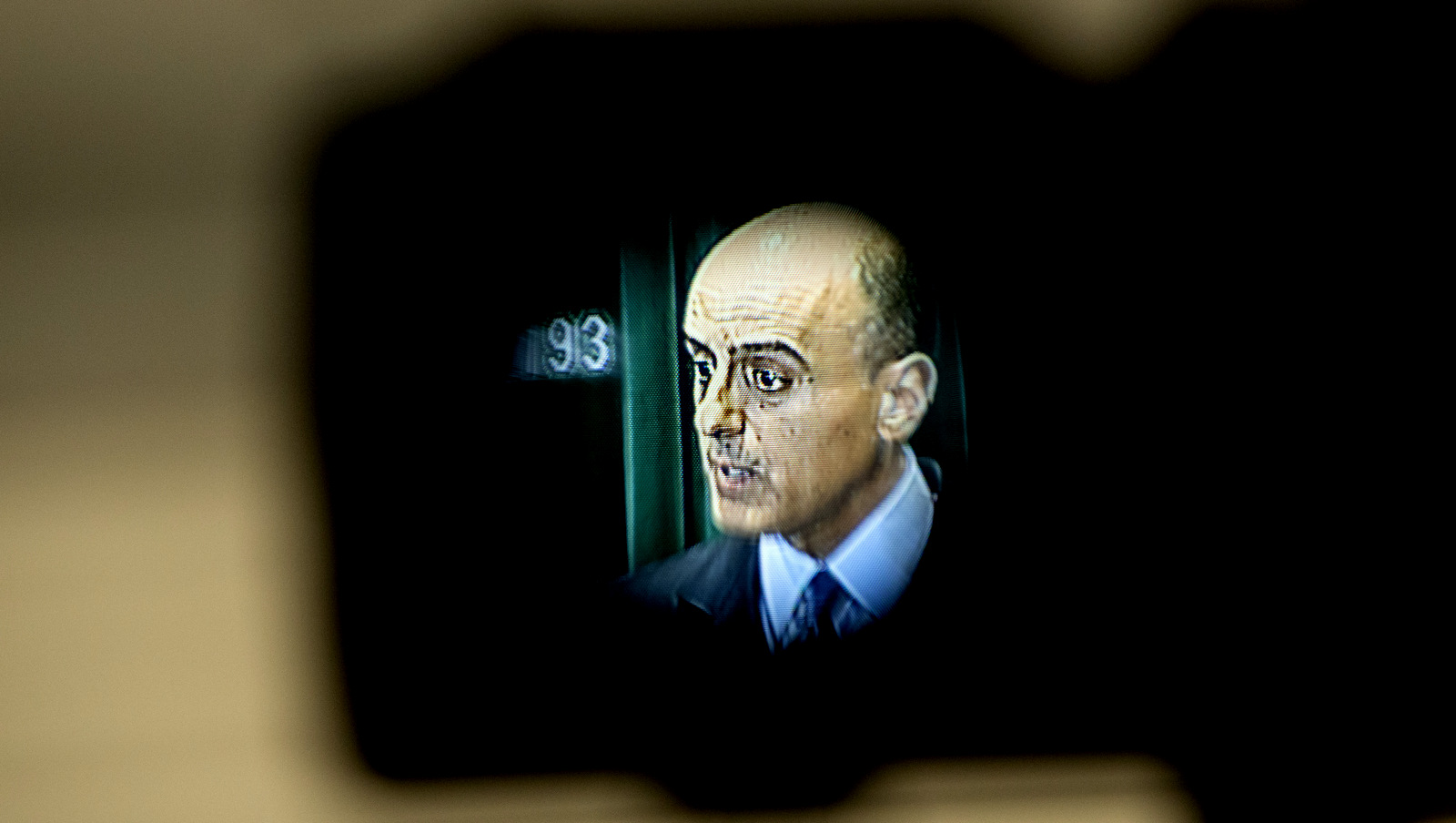
Seen in a video camera viewfinder, Saudi Arabian Ambassador Adel Al-Jubeir speaks about the Saudi military campaign in Yemen during a news conference at the Saudi Embassy in Washington,
Saudi Arabia has failed nearly all of its political and military objectives in Yemen. There is, however, one goal Riyadh has achieved: isolating Yemen from the international community.
In the rare event that mainstream media covers Yemen, the content is so filled with lies and blame-shifting as to distract from Riyadh’s, Abu Dhabi’s, and Washington’s war crimes.
Between the media blackout, travel restrictions, ban on foreign journalists entering the country, and financial blackmail in the United Nations, Yemen’s suffering is all but forgotten.
The Saudi-imposed and U.S.-enforced blockade restricts all land, sea, and air imports, exports, and transportation. Not only has the Sana’a airport been closed for most of the war, but coalition warplanes also destroyed the airport’s communication infrastructure.
Anyone who wishes to enter or exit the country must pass through Aden, where Riyadh and its allies have set up an improvised capital. Although mainstream media outlets like Reuters and The Guardian say that the so-called Houthis limit press freedoms and detain journalists, it is really the Saudi coalition creating the media blackout.
Foreign journalists are not allowed to enter the country. The very few who are able to enter must receive security clearance from Riyadh — where the Yemeni “president” lives.
As I’ve covered for MintPress in the past, Saudi Arabia has a tight grip on both Western and Arab media outlets. Through thousands of subscriptions at inflated rates and other backdoor financial methods, Riyadh ensures that news outlets take a “containment” or “neutralized” approach when covering its behavior. WikiLeaks exposed this systemic control of the media through the “Saudi Cables.”
Owing to Riyadh’s media monopoly, I found it important to ask al-Houthi what he thought English-language readers should know about the Saudi aggression and skewed coverage of his movement.
His first response included the truth about al-Qaeda in Yemen (AQAP). Although Saudi Arabia and the United States claim to fight terrorism, their militias — including senior commanders — arm and fight side-by-side with terror groups like AQAP and ISIS against Ansarullah. As Al-Houthi pointed out:
All they are doing is supporting them – al-Qaeda and ISIS – by arming them and granting them many opportunities to be the stronger in the face of the Yemeni people. They want [from what they do through these militias that they claim to be terrorists] to control the Yemeni people. They know that some of the ministers in Hadi’s government are included in the [terror] list declared by the U.S. Treasury, and they today stand by this government, which has these wanted terrorists, or have links to terrorists, yet they – U.S.-Saudi-U.A.E. coalition – fund them financially, economically and militarily.”
For an example, al-Houthi points to the former so-called Vice President General Ali Mohsin with ties to the al-Islah party, Yemen’s Muslim Brotherhood offshoot. Al-Houthi says Mohsin, as well as other members of al-Islah, are either wanted by the U.S. Treasury Department for recruiting al-Qaeda members in Afghanistan or have links to individuals on this terror list. Despite this, al-Houthi says the United States supports Mohsin and has even helped him open camps to strengthen AQAP and ISIS in Yemen. Mohsin (who has links to both Osama bin Laden and the late President Saleh) has a history of resettling Afghan terrorist fighters in Yemen.
But terrorism isn’t Ansarullah’s only concern. One of its top priorities has always been fighting political fraud — in a country notorious for corruption.
Al-Houthi said all the most corrupt entities in Yemen stand with the Saudi coalition today and, in order to tackle this systemic corruption, the entire state administrative apparatus must be dismantled and recreated.
He said this self-determination is Yemen’s right, which should include democratic and transparent presidential elections, parliamentary elections, and referendums:
We have moved against those corrupt people by a legitimate action, a popular movement that came from the people’s concerns, aspirations and hopes, and therefore the international community must recognize that the Yemeni people have the right to self-determination.”
Al-Houthi also pointed out the hypocrisy of the United States — which calls itself a champion of democracy, yet supports oppressive monarchies, reactionary regimes, and notorious human-rights violators like Saudi Arabia and the United Arab Emirates.
With this history, how can it possibly offer a solution to Yemen — a republic?
I think it is very stupid for anyone to look at reactionary states such as Saudi Arabia, the United Arab Emirates, and the coalition countries that stand by them as pioneers of democracy or able to offer solutions to the Republic of Yemen. This is counterproductive and unrealistic. A monarchy — which imprisons anyone who criticizes them for years, like activist Ra’if Badawi or others who have been jailed or executed — cannot provide democracy to the people of Yemen or work to give the Yemeni people their full rights.”
The Kingdom is known for its “radical reactionary” rule, criminal behavior, and hostility towards genuine democracy at home and abroad. How can anyone who claims to support human rights and political freedom ally themselves with Saudi Arabia and the United Arab Emirates?
Al-Houthi concluded:
What is clear is that the U.S. administration stands by criminal regimes that do not work for rights and freedoms, but rather to confiscate the rights of Arabs.”

